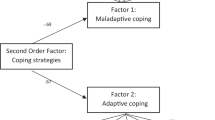Abstract
This brief report describes the psychometric properties of an instrument designed to measure Hurricane Coping Self-Efficacy (HCSE). Survivors of Hurricane Andrew (n = 165) and Hurricane Opal (n = 63) completed the HCSE and assessments of optimism, social support, distress, and resource loss. Principal components factor analyses revealed a unidimensional structure for the HCSE. Internal consistency of the HCSE was strong. In both samples, HCSE was positively associated with optimism and social support, but negatively associated with general psychological distress, trauma related distress, and resource loss. Finally, hierarchical regression analyses demonstrated that the HCSE explained a significant amount of experimental variance for intrusive thoughts and avoidance after controlling for social support, lost resources, and optimism.
Similar content being viewed by others
References
Bandura, A. (1986). Social foundations of thought and action. New Jersey: Prentice-Hall.
Bandura, A. (1988). Self-conception of anxiety. Anxiety Research, 1, 77–98.
Bandura, A. (1997). Self-efficacy: The exercise of control. New York: Freeman.
Baum, A., Gatchel, R. J., & Schaeffer, M. A. (1983). Emotional, behavioral, and physiological effects of chronic stress at Three Mile Island. Journal of Consulting and Clinical Psychology, 51, 565–572.
Benight, C. C., Antoni, M. H., Kilbourn, K., Ironson, G., Kumar, M. A., Fletcher, M. A., Redwine, L., & Schneiderman, N. (1997). Coping self-efficacy buffers psychological and physiological disturbances in HIV infected men following a natural disaster. Health Psychology, 16, 248–255.
Benight, C. C., Ironson, G., Wynings, C., Klebe, K., Burnett, K., Greenwood, D., Carver, C. S., Baum, A., & Schneiderman, N. (in press). Conservation of resources and coping self-efficacy predicting distress following a natural disaster: A causal model analysis where the environment meets the mind. Anxiety, Stress, and Coping.
Benight, C. C., Swift, E., Sanger, J., Smith, A., & Zeppelin, D. (in press). Coping self-efficacy as a mediator of distress following a natural disaster. Journal of Applied Social Psychology.
Carver, C., Scheier, M. F., & Weintraub, J. K. (1989). Assessing coping strategies: A theoretical based approach. Journal of Personality and Social Psychology, 56, 267–283.
Cohen, S., Mermelstein, R., Kamarck, T., & Hoberman, H. M. (1985). Measuring the Functional components of social support. In I. G. Sarason & B. R. Sarason (Eds.), Social support: Theory, research and applications (pp. 73–94). Boston, MA: Martinus Nijhoff Publishers.
Derogatis, L. R. (1983). The SCL-90-R manual; Scoring administration, and procedures for the SCL-90-R. Baltimore: John Hopkins University School of Medicine, Clinical Psychometrics Unit.
Freedy, J. R., Shaw, D. L., Jarrell, M. P., & Masters, C. R. (1992). Towards an understanding of the psychological impact of natural disasters: An application of the conservation of resources stress model. Journal of Traumatic Stress, 5, 441–454.
Horowitz, M., Field, N. P., & Classen, C. C. (1993). Stress response syndromes and their treatment. In L. Goldberger & S. Breznitz (Eds.), The handbook of stress: Theoretical and clinical aspects (pp. 757–773). New York: Free Press.
Horowitz, M., Wilner, N., & Alvarez, W. (1979). Impact of event scale: A measure of subjective stress. Psychosomatic Medicine, 41, 209–218.
Lazarus, R., & Folkman, S. (1984). Stress, appraisal, and coping. New York: Springer.
Scheier, M. F., & Carver, C. S. (1985). Optimism, coping, and health: Assessment and implications of generalized outcome expectancies. Health Psychology, 4, 219–247.
Tropical Prediction Center (1996). The deadliest, costliest, and most intense United States hurricanes of this century (and other frequently requested hurricane facts). NOAA Technical Memorandum NWS TPC-1. Miami, Fl.
Author information
Authors and Affiliations
About this article
Cite this article
Benight, C.C., Ironson, G. & Durham, R.L. Psychometric Properties of a Hurricane Coping Self-Efficacy Measure. J Trauma Stress 12, 379–386 (1999). https://doi.org/10.1023/A:1024792913301
Issue Date:
DOI: https://doi.org/10.1023/A:1024792913301




